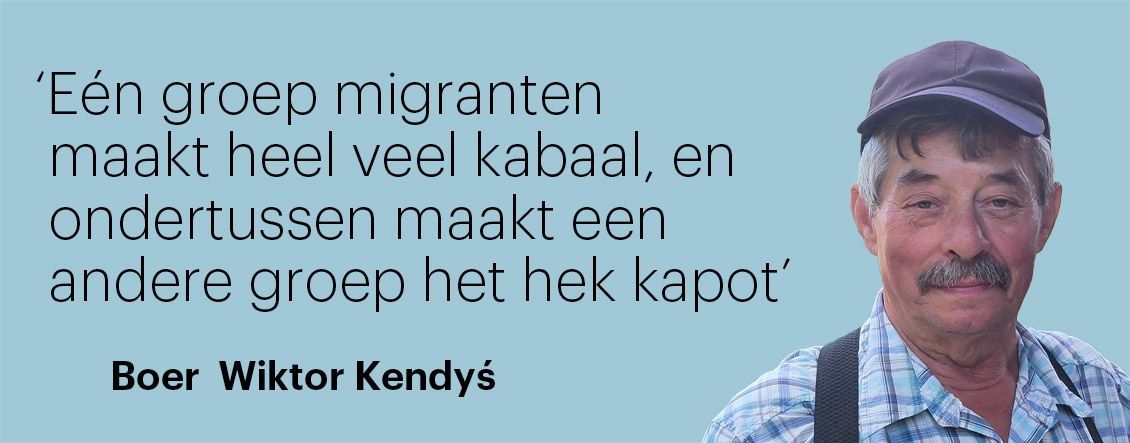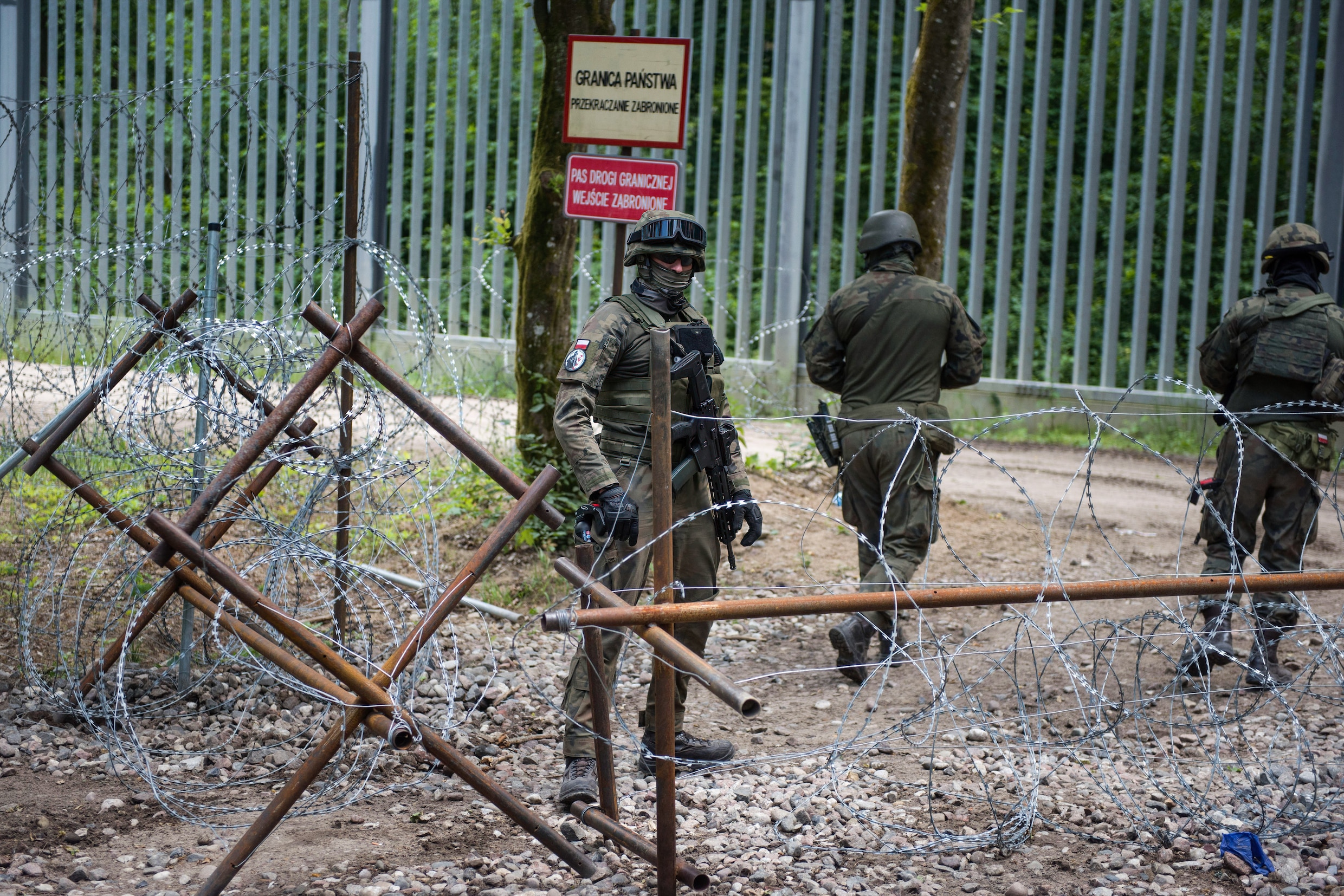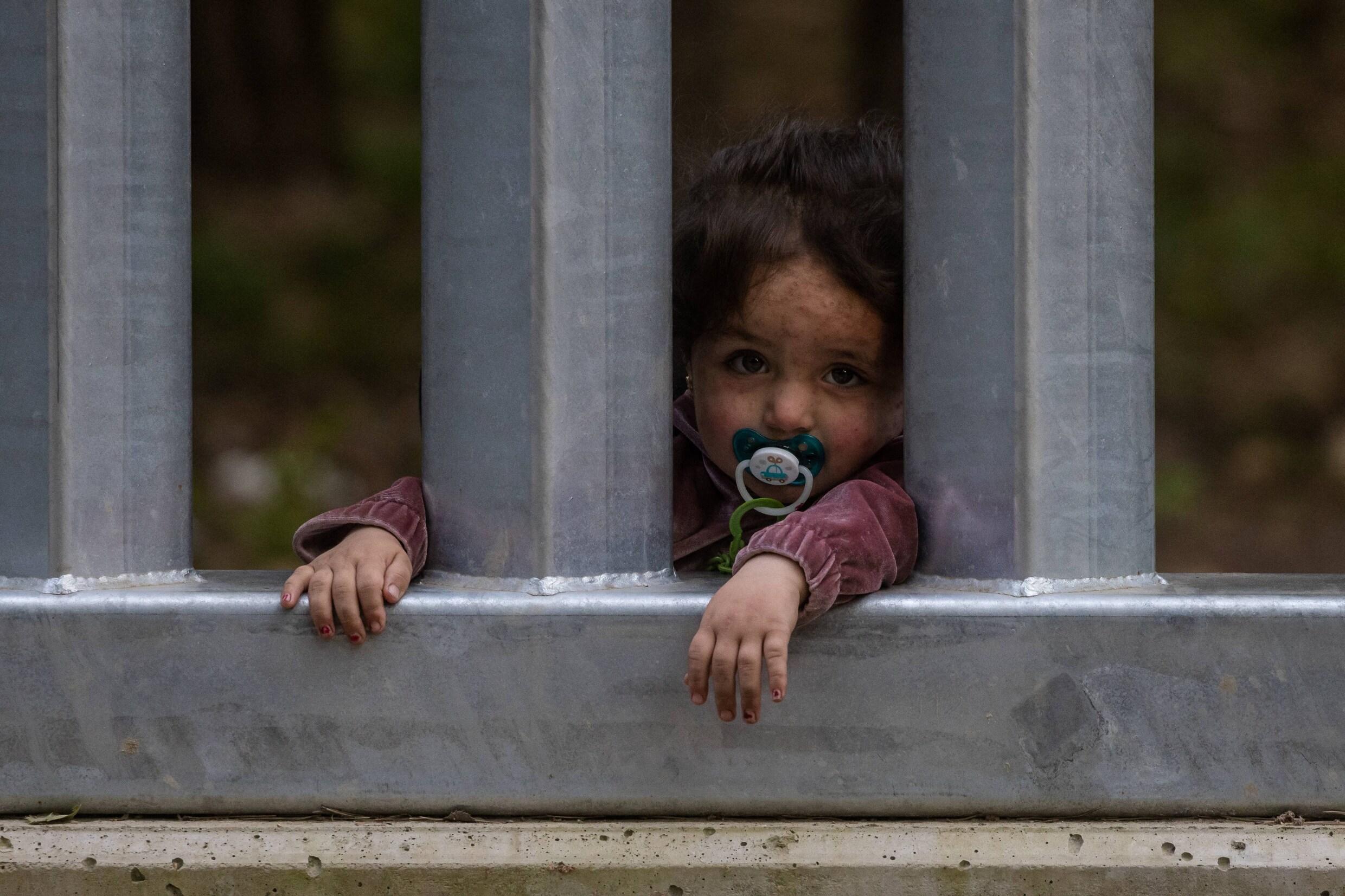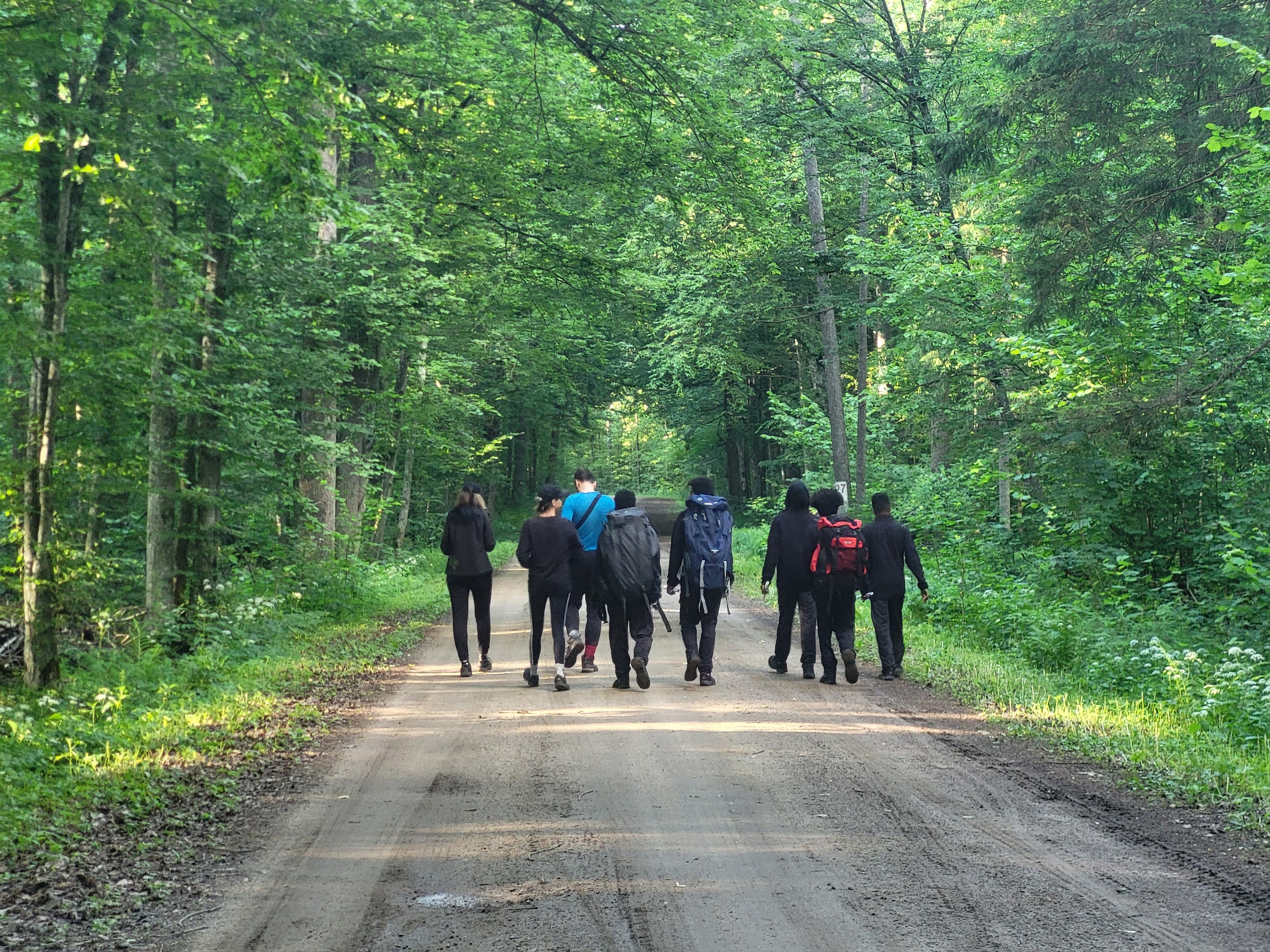“These immigrants are everywhere. They cross the border and cut my fence,” says Wiktor Kendyś angrily. “My wife and I have to walk almost three kilometers along the fence in the morning to see if it has not been destroyed somewhere, otherwise the cows will escape.” A herd of brown cattle look on curiously as their owner shows where the mesh has been temporarily tied.
Its pastures are located right on the border with Belarus. Behind the five-meter-high border fence gather people from Asia and Africa who have flown to Belarus as “tourists” and now want to move on. Mr. Kendyś’s cow wire is for them the last barrier on the road to Europe. It’s a piece of cake compared to the bars of the border fence and the coils of barbed wire. “Look, here, there, everywhere, completely cut into pieces,” Kendyś points out. “No one will reimburse me for my expenses. That’s why I’m against refugees.”
In winter it was quiet, he says. “But since spring there has been chaos and noise. “There are soldiers, but yes, you cannot guard the entire border.” He sees them pass by regularly, immigrants on their way to his European dream. “They take a jack and then they just bend those bars open. “These are young guys, in their twenties, who are very affected by this.”

Duty to report migrants
Two months ago a group knocked on his door. “There were three black people at the door,” he says. The Polish word she uses is murzyn, a designation for blacks that is no longer accepted in Polish progressive circles. “They asked for water. I gave them water and let them charge their cell phones when they asked. But it was my duty to report them to the border guard, because they are illegal people. So that’s what I did.”
He doesn’t know where they came from. “I don’t speak foreign languages.” He doesn’t know what happened to them either. “No idea. I don’t know what the border guard does with them.”
There is a good chance that they would be immediately returned across the border, without being able to apply for asylum. According to aid organizations, these so-called “rejections” are the order of the day. Kendyś shrugs. “Then they should apply for a visa instead of wandering illegally in the forest.”
This is what the majority in conservative Catholic eastern Poland think. Kendyś’s neighbor Sławek also recently encountered “a black man.” “I was terrified. I thought there was an ordinary person crossing the street. I wanted to go up to him to smoke a cigarette, but suddenly I saw that his whole face was completely black. And his hair was black too! I ran away,” he says. Sławek does not want his last name to appear in the newspaper.

Incidents are the order of the day
Klakowo is nothing more than a few wooden houses, slowly chewing cows and a lot of forest. The path between the border fence and the barbed wire fence also seems calm, until suddenly a soldier comes running. In the forest on the Belarusian side, screams and swearing can be heard. Male and female voices. An army truck arrives at high speed. Military crowd at the fence. Farmer Kendyś sees it almost every day: “A group of migrants makes a lot of noise, so the soldiers arrive there, and meanwhile another group breaks the fence in another place.” A shot is heard some distance away. The screams of the forest cease. “A warning shot,” says Kendyś. “Shots are fired every day.” The figures bear this out: since the beginning of this year, Polish officials have fired 700 warning shots, 500 of them in May.

Incidents are the order of the day. Soldiers and border guards receive stones, bottles and fireworks. Recently, a 21-year-old Polish soldier who was stabbed through the border fence from Belarus succumbed. That same day, it emerged that three soldiers had been arrested earlier for allegedly firing live ammunition into the ground near the fence, risking a bullet ricocheting towards the Belarusian side.
According to Polish Prime Minister Donald Tusk, the migration crisis is part of a “hybrid war.” Putin and his Belarusian vassal Lukashenko open the immigration tap to destabilize Europe at their convenience. “We live in a pre-war era,” concluded Tusk, who increasingly presents himself as a Cold War prime minister. The eastern border is reinforced with a concrete and electronic defense line, which has already been popularly called the Tusk line.

Border strip prohibited for journalists and humanitarian workers
The death of the 21-year-old soldier and the arrest of three other soldiers have further heightened the tone. “The entire government should resign,” Kendyś believes. “It should not be the case that anyone treats refugees as friends and condemns our soldiers.” His indignation is great: “Isn’t it possible that in a civilized country a soldier is shot down and not even allowed to fire a warning shot? And then put a soldier who does that in prison?
In response to criticism, Tusk’s government has relaxed rules on the use of firearms at the border. What would normally be considered a crime will be treated here as an infraction. Since Thursday, the border strip has once again been prohibited for journalists and humanitarian workers. “You won’t be allowed to come here anymore,” says the old farmer, satisfied. There are several days left before the zone comes into effect. His wooden house is less than two hundred meters from the border, that is, in the area.
“You” refers to journalists, but especially aid workers searching for migrants in the forest before the border guard finds out about them. They make each migrant sign an asylum application, written in Polish and their native language, as well as a power of attorney. This allows a specific care provider to advocate for the migrant’s interests during the asylum procedure. Once these documents are signed, they can leave the forest and present themselves to the border guard, with a much lower risk of rejection.
“False documents,” growls farmer Kendyś. According to him, the activists are complicit in human trafficking. “Once these refugees have those documents, the border guard will no longer be able to do anything. Let those activists take in ten people themselves. But no, they receive money from donors and celebrate.” His conclusion is clear: “Those activists must be punished.”
If it were up to Mr. Kendyś, Katarzyna Poskrobko would have been punished in an exemplary manner a long time ago. Instead, the 45-year-old is organizing an exhibition in the nearby town of Hajnówka. ‘What do the trees see?’ It is part of a campaign to raise awareness about what is happening in the vast virgin forest between the town and the border. In the middle of the room there is a tree made up of sleeping bags, backpacks and other things that immigrants left in the forest. On the walls hang words written on cardboard: “No person is illegal” and “Poland is not only for Poles.”
The latter is not at all evident in Hajnówka, where a well-organized nationalist organization operates. Unlike most volunteers and employees of humanitarian organizations, Poskrobko was born and raised here. “My neighbor posted comments on my Facebook page. He vilified me: reactions full of hate and contempt. But then we met in front of the house and he apologized.” On another occasion his car was covered in paint. “I don’t know if it was intentional or not.” In the case of another activist’s car there was no such doubt. “They had barbed wire wrapped around the tires.”

“The counterreactions go against the constitution”
Many activists had pinned their hopes on Donald Tusk, the pro-European liberal politician who served for years as president of the European Council and became prime minister in December. But it soon became clear that Tusk did not break with the policies of his nationalist predecessors: “A disappointment,” says Poskrobko. “Many of us were hopeful that the illegal regulations allowing returns would be quickly repealed. Refunds are unconstitutional and also ineffective. “People can be sent to Belarus, but they can’t return to their home country, so they come back here.”
Many people in Warsaw think that the migration crisis has been solved since the high border fence was built, Poskrobko points out every time he visits the capital. In his opinion, instead of solutions, politicians are causing even greater polarization around the issue of migration. With the death of the stabbed soldier, the situation is once again very tense, he warns. “Everyone is talking about it. But what about the dozens of people who died in the forests? Is a white man’s life worth more than all others?
When the refugee crisis broke out in 2021, he had a regular job at a trading company. She signed up as a volunteer, but after a year the assistance had become so professional that she ended up working at the Podlasia Voluntary Humanitarian Ambulance (POPH). She helps migrants who end up in Hajnówka hospital after weeks, sometimes months, of wandering through forests and swamps.
“It has changed my life dramatically.” She has Africa close to her heart. Literal; a necklace with a golden miniature of the black continent attached. “There is no such thing as a coincidence. I once found it in front of my house when I was young. I didn’t wear it for years because I didn’t like the color gold. When I started wearing it, Africa came here.”

Five young people from Eritrea
The next day, Africa has the face of five young people from Eritrea. POPH aid workers provided them with documents and guided them out of the forest. They sit huddled on the wooden bench in a parking lot where tourists leave their cars to take a walk in the forest. They were, like all young Eritreans, the only soldiers who spoke any English. They say they survived for two months in the forest on the Belarusian side of the border, largely without food.
Every day, POPH and other aid organizations bring groups like this out of the woods. The border guard has been informed, but it takes hours to arrive. Meanwhile, aid workers tell what they have heard from migrants who have camped for weeks in a narrow strip along the Polish border. The perpetrator of the stabbing that killed the 21-year-old soldier is said to be a Moroccan who is cooperating with the Belarusian police. The story comes from a migrant who claims to have been an eyewitness to the incident.
Research must prove whether this is correct or whether this is an Indian story. But what does Poland do if the perpetrator was indeed targeted by the Belarusian authorities? And conversely, what does Belarus do if one of its officials is unexpectedly hit by a ricocheting bullet? In the border village of Klakowo, fear is expressed by Sławek, who fears one thing even more than the “black” he encountered: “It will probably end in a war,” he is pessimistic. “If it is a provocation, like now with the soldier who was stabbed, then there is a good chance of war.”
The editorial office knows Sławek’s full name
Also read:
Polish border guards may shoot migrants illegally crossing the border with Belarus
The Polish government establishes an exclusion zone along the border with Belarus. Border guards may shoot illegal immigrants there trying to get in.





